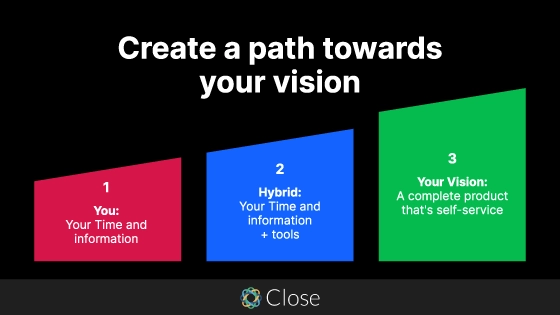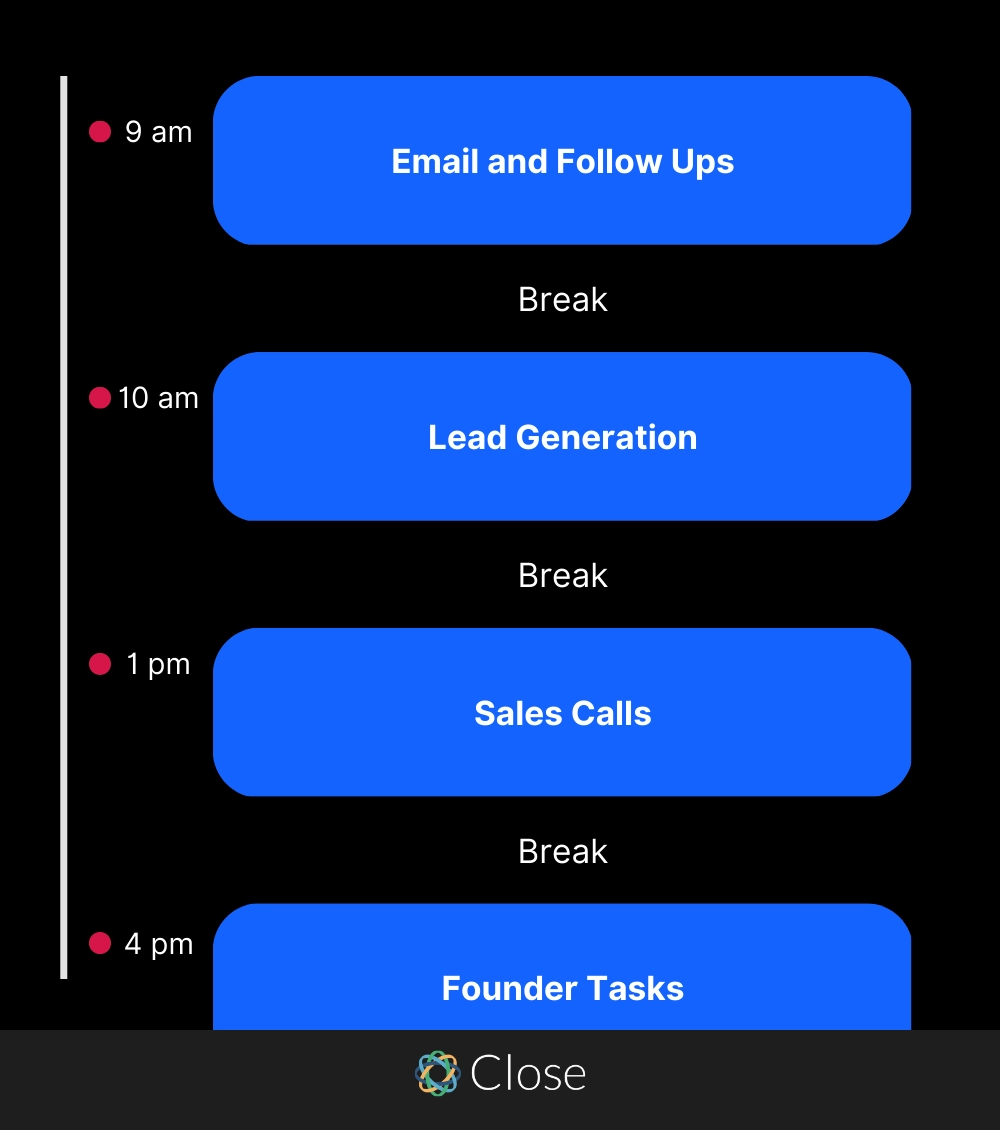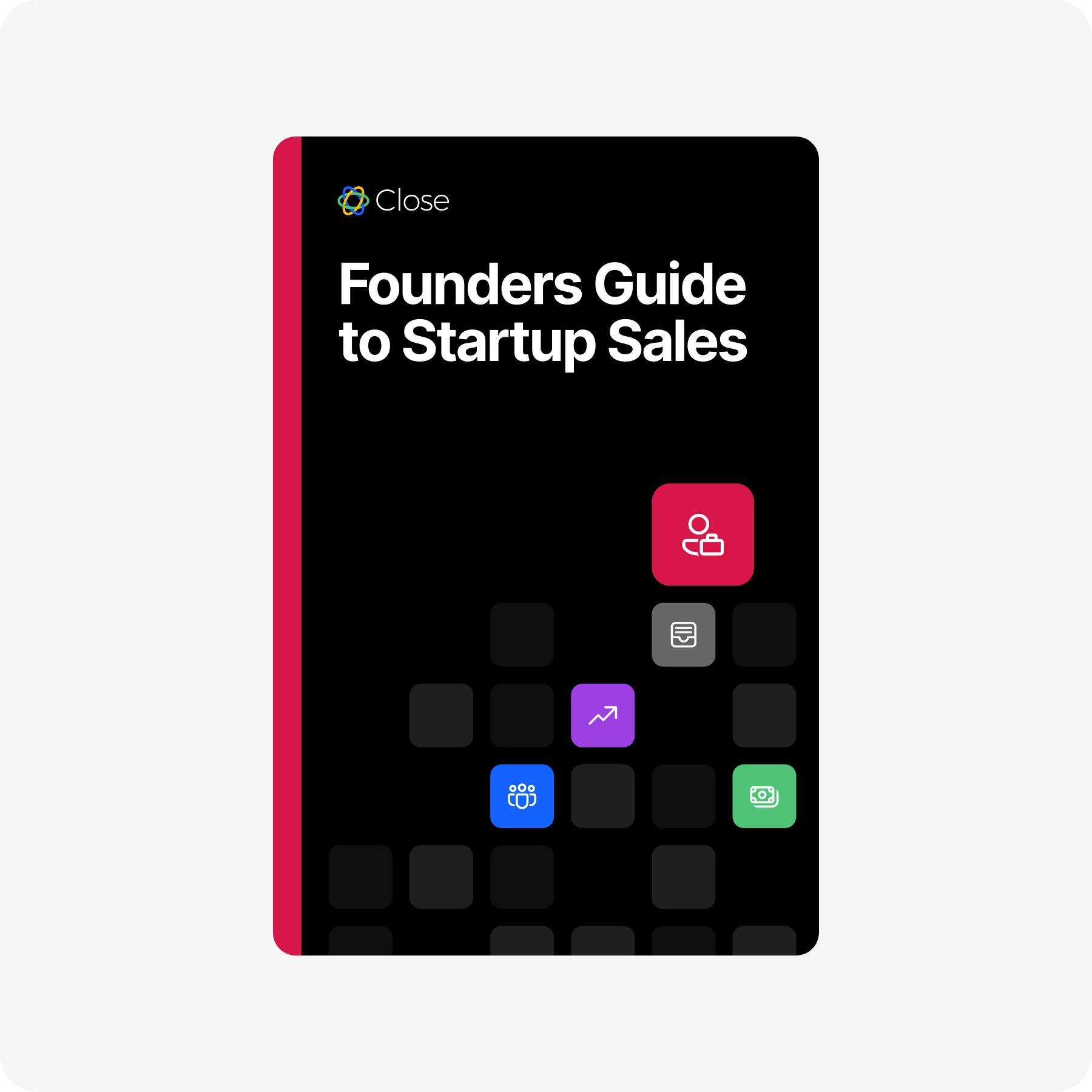Life as a startup founder is a rollercoaster. We all know about the ups and downs, but it’s really about all of the sudden twists and turns that are impossible to predict and will try to distract you.
I’ve been there. As a former founder (Smart Host, 2014-2017) and longtime member of the Close team, I know firsthand what it takes to scale a business from zero and can attest that there are no shortcuts.
While winning the startup game requires a bit of luck, I do have one piece of advice that will help increase the odds… and that advice is to make sure you (or at least one co-founder) ruthlessly prioritizes sales.
Investing in sales as your number one priority will help you shut out the noise and open doors much faster. This guide will help you put together a sales process for running sales without a product and small amount of resources that will help you achieve the results you need to move the business forward.
Why Sales Should Be a Startup Founder’s #1 Priority
If you’ve never done sales before, the previous sentence may have put you on edge. After all, you’re a founder. Do you really have to do sales?
Yes, absolutely, 100 percent.
Here’s why:
- It’s harder than ever to raise capital: Your new startup needs cash, now. And the best form of investment you can receive is through your customers. It’s what we did here at Close, and more than a decade later, we’re thriving without raising a single cent of capital.
- Sales helps you find your ideal customers really quickly: When you’re in the nitty-gritty of talking to leads and finding the right customers for your business, you’ll quickly identify which customers get the most value from your products or services.
- Sales helps you find product-market fit: You’ll quickly size up a specific profile for customers that make sense for your business, build customer retention, and improve NPS scores—all of which will help you build a pitch for investment if you decide to go that route.
- Sales brings clarity: Nobody said it was easy. But when you go out there, close deals, get customers, and (perhaps more importantly) lose customers, you’ll gain clarity of purpose for your business much faster.
How to Begin in Sales as a Startup Founder
Early-stage sales must always begin with the founders. So if you’re flying solo, it’s clear—you’re the person who will do everything.
But, what if you’re part of a founding team?
For small startups, even if you have multiple founders, one person should be entirely responsible for all things customer-facing—including sales, support, and success.
Why do I make this a hard and fast rule? Two reasons:
First, sales by committee equals no accountability. When you have one founder responsible for sales and another for the product, it’s clear who’s pulling their weight and who’s not. And it encourages you to make sure results are delivered.
Second, when sales is the responsibility of one startup founder, that person becomes an absolute advocate for the customers. This person comes into meetings with a slightly biased opinion—they are the representatives of the businesses’ customers, the voice of reason communicating on their behalf.
Of course, being a sole salesperson and founder can only last so long. So, when should you hire your first salesperson?
Here’s my recommendation: Only hire a salesperson once you have a repeatable process in place.
Everything is a test until you can repeat it and scale it. Once you can do that, it’s time to hire a salesperson.
Eventually, you’ll want to hire a Head of Sales or a similar role to take over the direction of this team. The ideal situation is to put this off until either:
- You’ve hired and onboarded two or more profitable salespeople
- You’ve hit $1M ARR
Until this point, you, as the founder, will act as a Head of Sales with any salespeople you hire.
Sales Team Framework for Startup Founders
Of course, most new startups don’t have a fully-fledged product yet. Maybe they’re still building it out, or maybe they’ve built an early-stage product without all the features they want it to have.
What should you do if you’re selling a vision that doesn’t align with what you can actually serve today?
It’s time to create a step-by-step path to your vision.
First, you want to get people excited about your vision. I was one of the first 1000 customers of Uber when it first started up, and while that may seem insignificant, it’s something I’m really proud of. People love to be part of the journey of a new startup, so when you make your first sales calls, sell them on that vision you’re creating.
But of course, a dream won’t get you cash in the short term. So, what can you sell now to generate revenue and help you build that vision?
Here’s my framework for startup founders to create their vision:

Let’s break this down:
Step 1. Sell Your Time and Information
If you don’t have a product to sell right now, then you can sell your time and domain expertise to customers.
Think of this a bit like consulting: what can you provide to customers from your own time and experience? (Not sure what that looks like? I’ll give an example below.)
Step 2. Sell a Hybrid of Your Time & Tools
As you start to build out your product, you can start to sell proprietary tools or intellectual property to your customers.
The goal here is to reduce the time that you as a founder are spending individually and increase the value your customers are seeing.
Step 3. Sell Your Vision
By this stage, you’ll be able to step back and let your vision take over. Once you’ve developed a fully functioning version of your product, customers will be able to use this self-serve rather than taking your time.
This may sound good, but how does it work in the real world?
Here’s an example of this framework: In 2014, I founded Smart Host, a dynamic pricing tool for home rentals that was later acquired. We wanted to create a product that homeowners could connect to Airbnb to manage the price of their listing, but it wasn’t fully built yet. Here’s how we followed the above framework:
Step 1. Selling Time and Information
We were able to scrape data from Airbnb about listing prices in any area. So, we offered our first customers a market report of all the home rental listings in their area, so they could see average prices. For $99 a month, we’d send them a monthly report and help them analyze it.
Step 2. Selling Time + Tools
After some time, we created a tool where users could log in and see the market reports independently without us needing to send these manually. Afterward, I’d offer to help drive insights and consult with them.
Step 3. Selling the Final Vision
Finally, we were able to sell a complete revenue management solution that our users could connect to Airbnb and automate dynamic changes to the price of their listings based on the information gathered about average listing prices in their area.
Using this framework, we were able to get customers on day five of creating our startup, and build product-market fit quickly.
Build a Founder-Led Sales Process in 4 Steps
Ready to start building a sales process for yourself? Here are four simple steps to get you started:
1. Lead Generation
Generating new leads is essential to the sales process. Everyone is excited about AI and automation today, but that’s not the answer to everything. In fact, with so many people automating the same process in the same way, it becomes difficult to separate yourself from the market.
Remember this principle: The machine you create to generate new leads is just as important as your product because this is how your company will grow and scale over time.
Example: Here at Close, we’ve built a 100 percent inbound sales process—we have no outbound salespeople on our team. How did we do this? By building a content machine that keeps generating leads every month.
Of course, this didn’t happen overnight. We started creating great content from the beginning, and it started paying dividends after three or four years. But now, a decade later, this content machine continues to help us scale.
At the beginning of your early startup sales process, 80 percent of your lead generation should be playing the short game. In most cases, this means using outbound sales, directly reaching out to new leads that fit your ideal customer profile. The other 20 percent of your lead generation should be investing in the long term, providing evergreen value to your audience.
As you grow, this will gradually change to 50 percent outbound, 50 percent inbound.
And eventually, you’ll flip the numbers—80 percent inbound, 20 percent outbound.
The key here is to play to your strengths. This will allow you to focus your efforts on what can drive the best results.
For example, at Close we had our CEO and Founder, Steli Efti. He has a ton of sales knowledge, and knows how to transmit it in an entertaining and valuable way. So, early on, we leaned heavily on him to build our content machine. He put aside things a founder should be doing to go out and give speeches in conferences or record video content for our YouTube channel.
On the flip side, when I was founding Smart Host, we figured out quickly how to scrape data from Airbnb and turn that into something valuable for our audience. At the time, our unique strength was data, and we used that.
2. Outreach and Opportunity Creation
When you’re ready to start reaching out to potential customers, remember that first you need to qualify them.
Here’s what you need to know:
- Are they in a position to purchase what you’re offering?
- Are they going to get value from what you’re selling?
Remember, it’s okay if they’re not qualified. You’ll part ways happier and avoid wasting each other’s time. And the door stays open in case they become qualified in the future.
Here are two of the biggest mistakes you can make as a founder selling your startup product (believe me, I know):
- Wasting time on deals that won’t close or won’t bring value. Time wasters are one of the biggest, deadliest obstacles your startup can face. Don’t waste your time trying to close one massive deal if it’s killing your productivity and distracting you from everything else.
- Giving things away for free. Above, we said that sales brings clarity to your startup—this is only true when the customer is paying. It’s far too easy for new customers to jump on board if you’re giving away free pilots because they have no risk. When both sides have risk involved, you’ll get a much clearer picture of your ideal customers, and will develop product-market fit much faster. While there may be some exceptions, selling something for money is a true benchmark of whether what you’re selling is valuable.
3. Managing Pipeline
As you build your sales pipeline out with new leads, don’t get distracted by vanity metrics like the sheer number of leads you’ve reached out to—that’s BS. You’re not generating new leads until they’ve replied to you.
The key here: Follow up. Build a solid process and mechanism to perform regular follow-ups with new leads. Keep following up as often as necessary until you get a response.
As you continue to nurture these leads toward a sale, a key skill you’ll need is to be really good at negotiation.
My favorite resource for this will always be the book Never Split the Difference: Negotiating as if Your Life Depended on It by Chris Voss. I absolutely recommend you read this.
4. Closing Deals
Now to the fun part 🤑
When it comes to closing deals as a founder, here’s a key principle to follow: Ask for the close early and often, even if you know they’re going to say no.
Ask directly: “What do we have to do for you to become a customer today?”
Nine times out of 10, they’ll say: “I’m not ready to become a customer yet. We haven’t talked to my legal team, we haven’t talked about price, we haven’t talked about integrations,” etc.
See what happened there? Your prospect has given you all the steps that it’ll take to close the deal. They’ve just given you a playbook for selling them.
That’s when you say, “So if we go to your legal team, and do XYZ, then you’ll become a customer?” If you get a yes, you have a clear direction.
So that’s asking early—but why should you ask often?
Keep asking about what you need to do to close this deal, because they often forget steps, and will probably add more steps to this process.
All of this requires you to change your mindset as a founder/salesperson: Expect the yes, embrace the no.
In other words, be confident in your offering and your value, but be ready to receive a negative response and keep moving forward.
Best Practices to Operate and Scale Founder-Led Sales Process
All of the above may sound good in theory, but how do you operate and scale your sales process as a startup founder? Here are some best practices to follow.
Use Time Blocks for Similar Tasks
Working one by one on leads is inefficient and will waste time.
Here’s what to do instead: Create blocks of time in your calendar for different tasks.

Many startup founders fall into the trap of finding a new lead on LinkedIn, importing them into the CRM, and spending an hour crafting the perfect, unique message to send them.
Doing this over and over again will kill your productivity and waste far too much time.
Instead, batch those tasks together: spend an hour searching for new leads on LinkedIn, and add them to a spreadsheet as you go. Then, bulk import that lead list into your CRM. That’s one task done, now go take a break or do something else.
After that, you can come back to this and create an email campaign to send these people.
As you start to put your process together, you’ll realize you’re spending more time on sales than you expected (or want to). But trust me—it will pay off in the end.
Document Everything
As a founder leading sales, your goal is to pass the baton to someone else eventually.
To do this smoothly, you need to start documenting everything you do, starting today.
As you develop your sales process, you’ll iterate on it and gradually find a repeatable way to close more deals.
With all of this clearly documented, you’ll be able to pass this over to a salesperson or Head of Sales in the future.
Hire Your First Salesperson
As mentioned above, a repeatable process is essential before you take on your first sales hire.
Another way to judge when it’s the right time is to use the 10/100 rule: After you close 10 big deals or 100 small deals, it’s time to hire a salesperson.
The ideal hire for a startup sales rep looks like this:
- People who are in the early stages of their career, either because they’re young or because they’re transitioning to sales or to your industry
- People who are eager to learn, not just coming for the paycheck and checking out
- People who are teachable
Personally, I’ve seen success with hiring college athletes as salespeople. That might sound a bit odd, but when you think about it, there is a lot of overlap between athletics and sales. Athletes are used to practicing—they believe in doing something 1,000 times to master it. They’re also used to being coached and taught. These are qualities that transfer very well into sales.
Onboard Your Sales Rep One Step at a Time
A lot of founders make the same mistake—as soon as they hire a sales rep, they figure it’s finally time for them to stop doing sales.
But remember: a founder selling their product will always have an advantage over a sales rep selling a competing product.
Instead of dumping sales onto this new salesperson and letting them go wild, offload tasks to them gradually.
Start at the top of the sales process—lead generation. Offload your lead generation tactics to them: Train them to find new leads, import them into the CRM, and hand them off to you for the next steps.
Once they’ve mastered that, they can start learning the next step in your sales process, and so forth.
Little by little, you’ll offload these sales tasks from your plate and build mastery over the sales process in your new rep.
Give Your Sales Reps Incentives Based on What They’re Doing Now
Sales incentives are often based on closing a certain number of deals or generating a certain amount of new revenue.
But think about this: If you’re gradually onboarding new reps into your startup sales process, it’ll be a long time before they close deals on their own.
Instead, develop sales incentives that motivate them on the tasks they’re actually doing. For example, you might set a quota for the number of leads they generate (with some quality control in place, of course), and incentivize them to hit that number.
Doing this will motivate new reps to master each step in the sales process.
Get Founder-Led Sales Right from the Start
I’ll freely admit it—running sales as a startup founder is hard work. But we all love a good challenge.
When you set up a straightforward process from the start, identify who you’re selling to, and follow the framework to build up to selling your vision, you’ll have a much greater chance at success.










.jpg)

